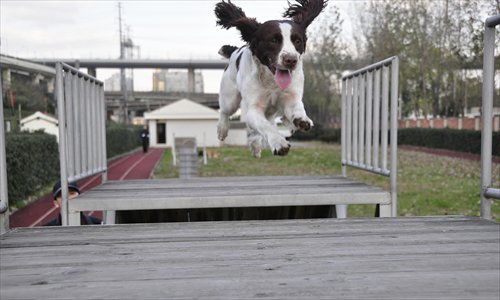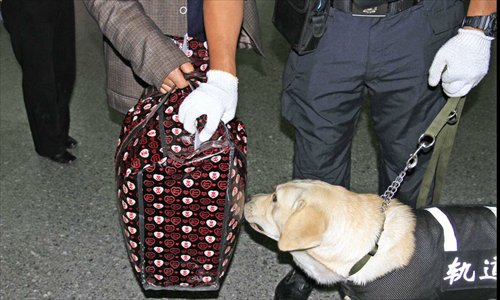A nose for trouble

An English springer spaniel in training Photo: Courtesy of the Police Dog Unit Center of the Shanghai Public Security Bureau Urban Rail and Bus Corps
Yuhuan looks like any other English springer spaniel as she plays, chases a ball, jumps and runs around. But this is her time off. Soon she will be back at work. The friendly 4-year-old is playing with her handler, Zhou Yingyi, at the Police Dog Unit Center of the Shanghai Public Security Bureau Urban Rail and Bus Corps.
When she goes on duty soon she will be totally committed to her job - she is a sniffer dog, trained to detect explosives and she works in Shanghai's metro stations.
Founded in 2006, the Police Dog Unit Center of the Shanghai Public Security Bureau Urban Rail and Bus Corps was the first professional police dog unit for the urban subway transport system. The dogs and their handlers carry out inspections over all the metro networks and are also used for major events staged in the city.
Checking luggage
Yuhuan and Zhou check passenger luggage at subway stations. She has been working with her handler for four years. Most dogs trained at the center are Labrador retrievers and springer spaniels, both medium-sized and friendly dogs. They are known as bomb or detection dogs.
After a morning's work, Zhou usually takes Yuhuan for a walk in a park or they return to the training center for a rest. The handlers look after two dogs but they only work with one dog at a time.
Bomb dogs are trained to smell bombs or explosive substances and they can be seen regularly working in metro stations; or sometimes they are called in for extra duties at major events like the World Expo 2010 in Shanghai and the CICA summit.
"We have bomb dogs working in all the city's interchange metro stations like People's Square Station and Century Avenue Station, to prevent explosives getting onto metro trains," explained officer Zhao Long, one of the handlers with the unit. "We also carry out random spot-checks at other stations."
Zhao told the Global Times that the bomb dogs could always sniff out explosives, no matter how they might have been hidden or disguised.
Nowadays armed police officers with bomb dogs are stationed at the major subway stations and passengers have to submit to stricter and more thorough security checks. "Bomb dogs save a lot of time as metro staff don't have to open luggage to check inside," Zhao said. "I have worked with my partner, Loyal, for four years and he never lets me down."
Loyal is a very intelligent springer spaniel. At work he is led by Zhao and sniffs along a row of bags and suitcases until suddenly he stops and lies down next to one. That is the way he signals he has found something suspicious.
For passengers the sight of these dogs not only cheers them but gives them confidence. "I feel safer when I see these cute puppies," said one passenger surnamed Huang at People's Square Station.
"Loyal can be mischievous at times. He is quite frisky and curious about almost everything he sees. It took us quite some time before we got to know each other. But now when I put his black vest on him, he's ready for work," Zhao said. "I was inspired by his skills and loyalty and that's how he got his name."

A Labrador retriever working as a bomb dog at a subway station in Shanghai Photo: Courtesy of the Police Dog Unit Center of the Shanghai Public Security Bureau Urban Rail and Bus Corps
Better than humans
"Not every passenger cooperates with the regulations and requests and puts their luggage through the X-ray scanners at the stations. If we see something suspicious we use the dogs to check it out. Dogs don't need to be taught how to smell. They are so much better than we are at detecting odors - their olfactory senses are 500 times better than human beings," Zhao said.
It's not any dog that can become a bomb dog. The public security department has an established series of tests to confirm whether a dog has the potential to join the police force.
"If a dog is naturally timid and overreacts to loud noises, it probably wouldn't be suitable for work in metro stations. It's natural for a dog to bark at a stranger or back away from one but bomb dogs can't do this. Our training centers are deliberately located near metro lines to get the dogs used to the noise of trains."
Dogs usually start training when they are about 2 years old, a period when they are ready to learn and can pick up things quickly. They learn non-verbal as well as spoken commands and can judge from gestures what their handlers want them to do.
It takes about six months to train a bomb dog and this involves basic discipline, obedience and odor detection. In training the dogs are given real explosives to work with and it takes about three months for them to learn how to detect and reveal explosives for their handlers. Regularly they return for testing and retraining to ensure they stay at their peak.
A friendly attitude
Zhou's other bomb dog is called Pudding. Whenever someone strolls past her kennel at the center, Pudding wags her tail and puts her paws through the wire fence seemingly wanting to become friends. For two years she has worked alongside Zhou checking luggage at metro stations in Shanghai.
At the center each bomb dog has its own kennel with an electric fan. A card on each kennel gives the dog's personal information and details, and special staff clean the kennels and help check the dogs' health.
To publicize its work and these special animals, the unit has created an official Weibo account - officers regularly post photographs of their dogs and record their daily lives. The pictures and blogs have proved quite popular, attracting about 15,000 followers.
Zhou said commuters and passengers in metro stations should try not to feed the dogs or take pictures with them - this can be a distraction from their work.
Dogs usually live for 10 to 15 years but working dogs often die earlier, because of stress or diseases contracted through their jobs.
"A dog who gets too old to work goes to our training center in Pujiang town in Minhang district for retirement," Zhao said. At present the oldest dog to have been retired is 10. Seven or eight dogs have now been retired from work with the unit.
Zhao said some handlers take their dogs home with them when the dogs retire. "But many of these working dogs cannot retire with their handlers because the officers don't have the facilities at home to look after a service dog."
Retirement challenge
Finding homes for retired working dogs is a challenge. "I believe it is humanitarian to give a working dog respect and care in its retirement," Zhou said. "Some people have asked if they could adopt a retired bomb dog. But they might not know just how much care and patience is involved in looking after one of these dogs. And the center would also have to arrange regular visits to check on their dogs."
"Love and patience are not the only things needed to take care of a retired dog. The cost might also put a major burden on an adopter and the family," Zhou said. "Retired dogs need special dog food, annual vaccinations and medical checks. It's much more difficult to establish a close relationship with an aging dog than with a young puppy."
Zhou said some people have suggested retired bomb dogs could be used as guide dogs for the blind. "But this is not practical - guide dogs have their own special requirements and it's impossible to retrain these older dogs," Zhou said.
"We treat them like family members and we hope they will live happy lives even after their working days are over," Zhou said.